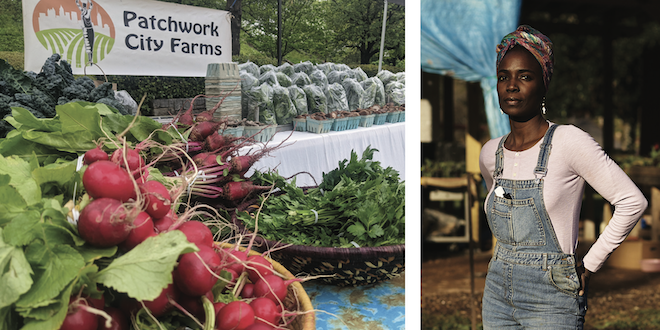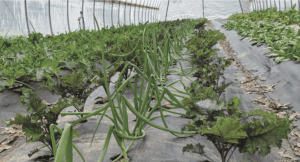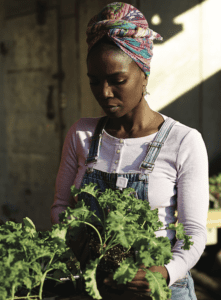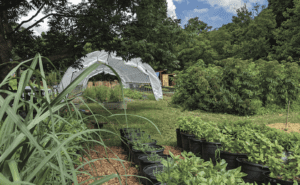

Jun 10, 2022Patchwork Farms offers healthy fresh produce for residents lacking options
An urban farm in a low-income Atlanta neighborhood is working to make healthy fruits and vegetables more accessible to the community.
Jamila Norman, founder of Patchwork City Farms, wants to shine a light on people growing food and regenerating land in disadvantaged communities into productive soil for fresh and healthy foods.
The 1.5-acre Patchwork farm is southwest of downtown Atlanta. Once an affluent part of Atlanta, the Oakland City neighborhood is now bound by freeways.
A diverse farm, Patchwork grows a variety of vegetables, fruits and herbs. Among its large catalog are baby greens, arugula, kale, Swiss chard, beets, carrots, eggplant, okra, peas, peppers, potatoes, radishes, spinach, winter squash, heirloom tomatoes, strawberries and melons, as well as sprouts and flowers.
Fruit also includes paw paws, pears, persimmons and figs. Norman plans to plant more fruit trees, likely including apples, plums and kiwifruit.


Certified Naturally Grown
Patchwork City Farms uses organic production methods, but it isn’t certified by the U.S. Department of Agriculture’s National Organic Program. Instead, it employs Certified Naturally Grown methods to make sure it’s taking care of the land with environmentally friendly methods conducive to healthy communities.
According to the Certified Naturally Grown website, farmers using the certification don’t use synthetic fertilizers, pesticides or herbicides and the crops are not genetically modified. The main difference between Certified Naturally Grown and organic is the certification model, “which relies on peer inspections, transparency and direct relationships,” according to the website.
“We (humans) were organic before organic was a thing,” Norman said. “For me, it was about going back to how things were.”
Industrial agriculture’s herbicides and pesticides are a recent development because in most of the world’s history, people have grown food without chemicals, she said.
Norman and her neighboring growers learn about production techniques through community sharing, understanding what works on one farm won’t necessarily work at another.
“It’s important to be open to that kind of experimentation and paying attention to your unique site,” said Norman.
To promote soil health, Norman’s operation does a lot of companion planting, crop rotations and composting.
Productive soil
Patchwork plants onions in the same beds of broccoli, kale and collards. Onions repel insects that like to feed on Brassica crops. For tomatoes, Norman plants lettuce or radishes on either side of tomato rows because those plants aren’t competing for the same nutrients. Tomatoes also consume significantly more nitrogen than radishes, she said.


Because of the smaller non-monocultural cropping scale of her growing operations, Norman’s crops are exposed to many pests. After witnessing an aphid infestation, instead of panicking about needing to treat the entire field to avoid losing all of the broccoli, Norman decided to pull those plants.
Using space more efficiently and getting more production out of a smaller area also helps with pest control, she said.
“We have a lot more flexibility in being able to get rid of insect pressure without necessarily feeling like my whole farm is about to go under,” said Norman.
Weeds, however, are another story. Norman must pull weeds by hand. The company transitioned to a woven plastic mulch where the cover helps suppress weeds.
“We uncover the beds if needed to rotate the crop to the next part of the farm,” said Norman. “We implement a bunch of different techniques. I am always observing, figuring out what works best where. We make numerous adjustments within the season and year to year.”
Georgia red clay
Crop rotations help break the cycles of soil disease influenced by repeated plantings of the same crop or same crop families.
“The focus is making sure our soil is healthy and robust and adding a lot of compost to it,” she said. “When you have healthy soil, you have healthy plants.”
Because Georgia’s red clay soil lacks organic matter, at the end of the season she composts plant residue and adds compost to the beds after every crop. Local tree companies supply wood chips for walkways, while local mushroom farms and peanut hullers and shellers supply compost material.
“It has been good being able to utilize those resources on the farm and help divert a lot of those nutrient-rich materials out of our landfills,” she said.
Because urban environments contain many hard surfaces that cause runoff and chemical infiltration, Norman’s water engineering experience helped her take an empty lot and turn it into a productive farm that captures rainwater.
This is helpful to the environment, but also nutritious for nearby residents.
“It’s important for us to say we are taking land in those communities and transforming them into healthy and productive useful spaces by producing foods that are healthy, too,” Norman said. “It’s important to implement
those sustainable practices in those communities that have suffered over the years from the ill effects of unsustainable operations in a bunch of different ways.”


Food is Life
Of Caribbean lineage, Norman grew up in a part of Atlanta where food options were limited. Her interest in farming began with some friends growing produce for her family.
In 2007, working as a state engineer, Norman farmed one acre on weekends and after work, sold her production at farmers’ markets. After being downsized, Norman continued part-time. Working with other neighborhood growers, she organized the Southwest Atlanta Growers Cooperative, which she managed.
After that and a second site’s leases weren’t renewed, Norman purchased undeveloped land and began production in 2018.
The farm produces for working-class communities with limited food options outside of corner stores and fast food. Older residents recalled a time of many backyard gardens, with visits to grocery stores only required for meat and staples.
“Food is life and is culture,” Norman said. “It’s what gives us the energy we need to be our best selves and to be healthy and not be in school hungry and malnourished. Communities that have been marginalized do understand the importance of food. They want good, healthy, safe and nutritious food. They have a legacy of that in their history. We just want to make sure it’s available and happens in the communities that need it.”
– Doug Ohlemeier, assistant editor; Photos at top: Patchwork City Farms, founded by Jamila Norman, is an Atlanta urban farm that grows a variety of vegetables and fruit, including radishes, baby beets, parsley, lacinato kale, baby greens, mushrooms and rainbow chard. Photos courtesy of Patchwork City Farms.














